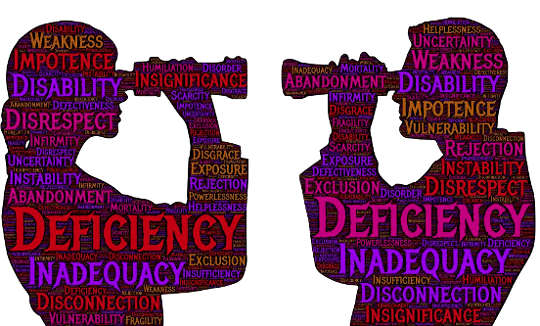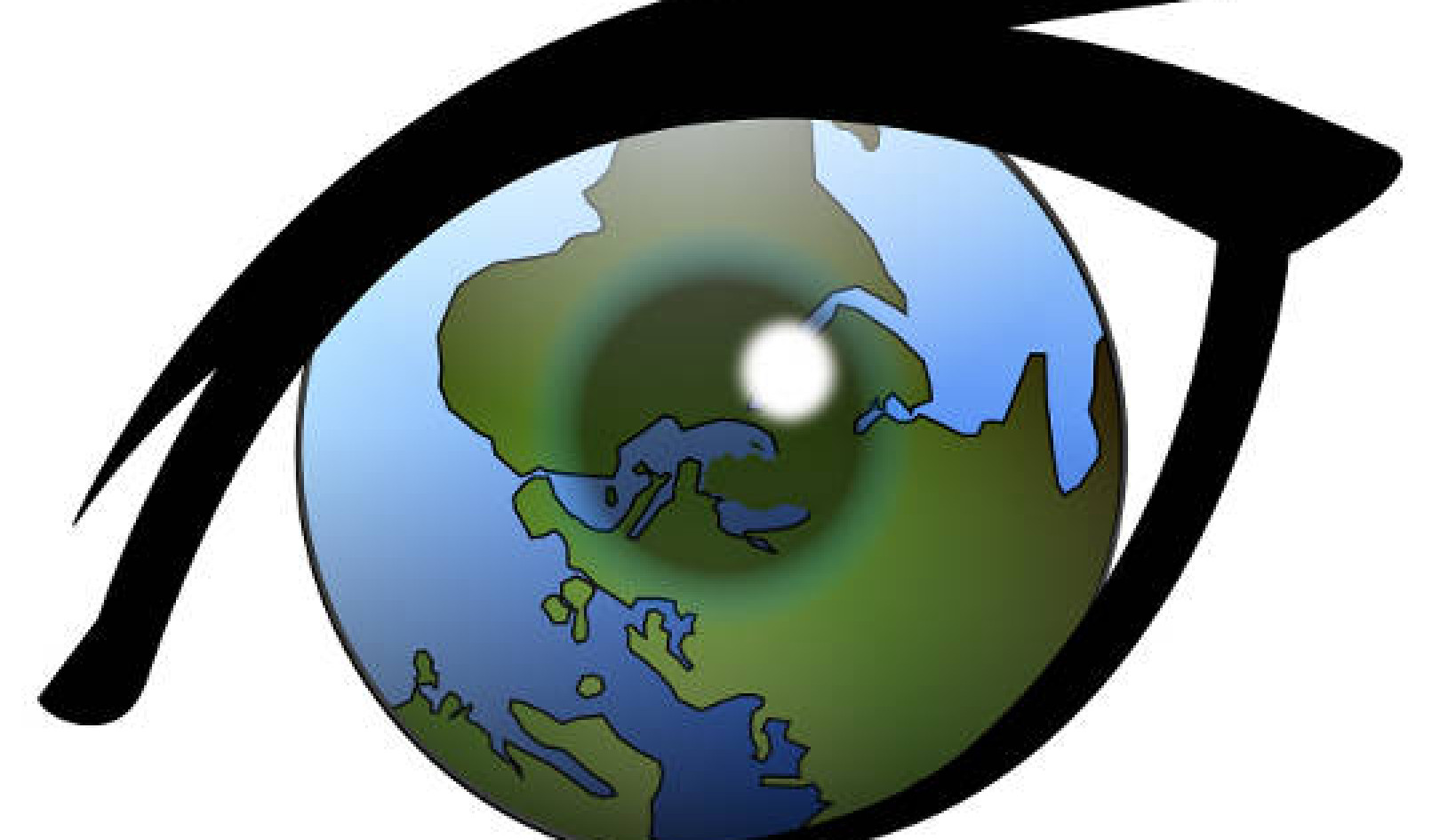
Image by John Hain
Confucius believed we should constantly work on improving our own lives. He felt that examining the foibles of others before considering our own weaknesses is a sign of arrogance and not worth our time or effort.
Seneca agreed with Confucius. He felt we should emphasize the inner soul of people, not clothes, jobs, wealth, or social status. Judging people on external factors is like buying a horse after examining only the saddle and bridle, not the animal itself.
The Science on Judging
Decades of research in psychology have shown that we have significant limitations in how we perceive the world around us. As an example, imagine our world is an enormous cathedral adorned with statues, paintings, stained glass windows, and numerous treasures; however, we are not allowed to enter the building. Instead, we only get to see inside through the keyhole in the front door. We can move our head around to get different angles of the main room, but we can never see everything. Yet, we believe we have seen the cathedral.
Human perception works in much the same way. Our brains would suffer serious overload if we tried to process all the stimuli competing for our attention. Research suggests our brains are capable of processing eleven million bits of data per second, but our conscious mind can handle only forty to fifty bits per second. Consequently, we learn to screen some things in and other things out. This is how we survive and make sense of the world. Yet, we believe our incomplete perceptions are reality.
This perceptual process is very active in how we see and evaluate other people. As humans, we are far too complex to understand everything about each other, so we create categories of people to organize our otherwise messy and chaotic world. These categories serve as shortcuts to simplify our interactions, relationships, and decision making.
Here are a few of the limiting cognitive processes that operate when we meet and evaluate new people.
Emotional State: People who are happy, kind, and emotionally stable tend to evaluate other people more positively. People who are unhappy, narcissistic, and antisocial are more critical of others and rate them negatively.
First Impressions: Our initial impressions of others, particularly of their face and physical appearance, impact how we evaluate and interact with them. These first impressions remain fairly durable over time and facilitate or impede our effort to develop relationships with people.
Missing Pieces: Once we have initial impressions of people, we tend to fill in other attributes we think are consistent with our limited information. For example, if we perceive people to be attractive, we attribute other positive qualities to their character. If we perceive people to be unattractive, we assign other less desirable qualities to them.
Group Mentality: In addition to filling in the missing pieces, we rely on the assessments of groups we belong to when evaluating other people. For example, if we belong to a political party that seriously dislikes members of another party, we will accept our group’s conclusions about the other party’s members without doing much investigation on our own.
Perceptual Consistency: Once we have fairly firm perceptions of other people and groups, we tend to focus on future behaviors that reinforce our own conclusions. For example, if we believe someone is intellectually challenged, we will perceive future actions that reinforce this conclusion and miss evidence suggesting the person has unique knowledge or skills.
Self-Projection: We tend to think that people in our various social groups think, believe, and act the same way we do. Hence, we project our thought processes and behavior patterns on them and overlook other unique aspects of their personalities.
Overconfidence: Once our world is nicely organized and people are superficially assigned to categories, we tend to believe that our worldview is accurate. In other words, we are overly confident that we have people and the world figured out.
Inaccurate Judgments, Stereotyping, and Implicit Biases
'These cognitive processes lead to inaccurate judgments, stereotyping, and implicit biases. What happens is we observe one or more dominant characteristic of people—race, religion, speech, attractiveness, group membership, and so forth—and then assign a host of additional qualities and put them into one of our categories. Numerous studies show how this unconscious process significantly impacts how we treat and interact with people in a wide variety of settings.
Here are just a few findings from the vast research on implicit biases.
Education: Teachers perceive attractive students to be more intelligent than other students. Hence, they spend more time with them, help them succeed, and give them better grades. Teachers also tend to underestimate the abilities of girls and racial minorities. These students are less likely to be tested for gifted programs and more likely to be disciplined and expelled from school.
Health Care: Racial and ethnic minorities receive less attention from doctors, are given fewer diagnostic tests, and experience lower quality of care than white patients. In addition, doctors are less likely to prescribe pain medication for Black patients than for white patients.
Legal System: Biases of police officers lead to more arrests and harsher treatment of racial and ethnic minorities. In addition, the decisions juries and judges make can be influenced by the defen-dant’s race, gender, ethnicity, and religion. Black individuals and ethnic minorities receive more guilty convictions and longer sentences than white defendants.
Finance Industry: We have fewer banks and financial institutions in nonwhite neighborhoods. Consequently, racial minorities lack access to savings and checking accounts and are more likely to use higher-priced check cashing services and payday loans. Racial minorities are also less likely to receive home loans even when they meet the standards for credit worthiness.
The Workplace: Job applicants who are perceived to be attractive and make a positive first impression usually get the job, while many highly qualified candidates get screened out for superficial reasons.
In addition, males are often perceived to be more competent than females, so women are less likely to earn comparable wages, be promoted, and receive leadership roles.
Attributing Actions to the Situation or to the Personality
In addition to these biases in institutional settings, we tend to judge people’s actions as being either situational or a permanent part of their personality. In other words, people may do things based on a unique situation they are in, but their behavior is not typical of their character. This may occur when people are feeling abnormal stress, being pressured at work, or facing an unfamiliar experience.
If we attribute their actions to the situation, we are less likely to develop biases toward them. If we attribute their behavior to their personality, our biases will be much stronger. Research shows that we tend to attribute the actions of people we know and like to the situation but attribute the behavior of strangers to their personality. In other words, we judge people we don’t know more harshly.
I am a strong proponent of this principle: when someone does something stupid, I think it may be a once-in-a-lifetime occurrence. I always try to attribute people’s behavior to the situation they are in, not their personality. I think Buddha would be pleased with this since he believed we don’t have a permanently fixed self anyway, and we will be different people tomorrow, and the next day, and the next day. So why judge people at all?
The Applications
1. Understand Our Biases
We all develop attitudes in life toward people, groups, things, and experiences. These attitudes become biases when we show prejudice for specific individuals or groups based on incomplete or inaccurate information. Sometimes we understand our biases, and other times we’re not even aware they exist. Either way, they can impact our behavior, relationships, and overall happiness.
Our biases are generally based on things like gender, sexual orientation, race, ethnicity, skin color, age, weight, religious preference, or political affiliation. The first step in overcoming unhealthy biases is to examine what they are and where they have come from.
Think about adverse attitudes you may have toward groups of people and ask yourself these questions:
What information or experiences have led to this bias?
How accurate is my information about this group?
How is this attitude impacting my behavior?
Identifying our biases is a good start, but it only reveals the ones we know about. A second helpful approach is to sit down with a good friend or partner and ask these questions: “Are there people or groups you feel I have biases toward? If so, can you give me examples from my speech or behavior? How do you think I would benefit from changing this attitude?” Be open, non-defensive, and willing to honestly reflect on what you learn.
A third way to understand our biases is to complete a formal assessment. One of the more popular ones is the Harvard Implicit Association Test, which is available online for free. This evaluation assesses our attitudes toward various groups of people. Complete some of the tests, see where you stand, and review your results with your friend or partner.
Once we have identified our biases, we have to decide if we want to change them. Changing our attitudes requires motivation and effort. If we truly want to grow as individuals, improve our relationships, and increase our happiness, we can make progress. Practicing the steps that follow will help us develop healthier attitudes toward other people.
2. View the World Horizontally
One of the things our egos do is put us on a vertical scale with people. Consequently, we tend to view ourselves as being either above or below other individuals and groups. If we view the world this way, we will always have negative attitudes toward other people and groups.
A healthier way to view the world is to see people on a horizontal plane. This approach assumes we are all equal, we all have value, and we all have something to contribute. It doesn’t put any of us above or below anyone else.
This horizontal view is idealistic but attainable with practice. It requires us to overlook external characteristics, refrain from judging, and sincerely desire to learn about other people. Over time, it leads to more friendships, healthier relationships, better solutions, and more civil communities.
3.0Improve Our Listening Skills
We learn about each other through our communication. Unfortunately, most of us are poor listeners—and we get worse with age. An interesting study shows that 90 percent of first and second graders are able to recall what a teacher has just said. The success rate drops to 44 percent for junior high students and 25 percent for high school students. Adults don’t do much better. Following a ten-minute presentation, 50 percent of adults can’t describe what was said, and two days later, 75 percent can’t even remember the subject.
Part of the problem is our capacity to process information. The average speaker talks at about 125 words per minute, but the brain can process 400 words per minute. This leaves a lot of excess capacity for dwelling on other things during our conversations. If we think we can multitask to fill in the gap, we are wrong. When we multitask, our brain switches back and forth between activities, and we completely space out of one task while focusing on the other. Research also suggests it takes up to 40 percent longer to multitask than it does to do tasks separately.
The invasion of technology is another culprit hampering our listening skills. Next time you are in a meeting or group discussion, notice how many people are looking at their phones, tablets, or computers. A tremendous amount of information is lost when we focus on our smart devices rather than paying attention.
The way we listen to other people becomes a habit that repeats itself. Changing our habits takes desire, practice, and time. Learning to truly listen can help us eliminate inaccurate judgments and biases we may have toward individuals and groups. Here are some helpful things we can do to improve our listening skills:
-
Put away our technology during our conversations.
-
Look directly at the speaker and maintain eye contact.
-
Watch for nonverbal cues that convey information.
-
Don’t judge or interpret while the speaker is talking.
-
Ask questions to better understand what is being said.
4. Squelch Negative Communication
Research suggests that we create a social reality for ourselves through our conversations with people. The more we talk about something, the more it becomes real and concrete for us.
This process not only works for things; it works for people as well. If we talk negatively about individuals or various groups, even if we don’t have any interaction with them, our negative attitudes become stronger and more concrete. These attitudes are often inaccurate or complete illusions. Consequently, one of the best ways to prevent and eliminate unhealthy biases is to refrain from negative conversations about other people.
The advice Thumper got from his parents in the movie Bambi is insightful: “If you can’t say something nice, don’t say nothin’ at all.” So try going thirty days without saying anything negative about any individuals or groups and see what happens.
5. Engage with People Who Are Different
While growing up, I was taught by a remarkable mother that God loves everyone, that we are all equal, and that no person or group is above or below anyone else. I believed these things but had very few experiences with anyone from a different race, religion, or income level.
It’s easy to say we care about people who are different when we don’t interact with them; it’s a whole different experience to live in the same neighborhood, see each other often, and work through challenges together. What I have learned is that we are far more alike than we are different, and we all want the same things in life: health, friends, happiness, loving families, and civil communities.
I think it is difficult to shed our superficial judgments without being around people from different cultures, backgrounds, and beliefs. Examining our biases can change our minds, but befriending people who are different changes our hearts.
Learning about other people’s experiences, challenges, dreams, and love for their families produces the greatest understanding. Here are some things we can do to overcome our biases and build more satisfying relationships:
-
Learn about different faiths and visit their places of worship.
-
Volunteer at a local food bank, kitchen, or homeless shelter.
-
Befriend people from different cultures and do things together.
-
Learn a foreign language and study countries where it is spoken.
-
Find an immigrant community and practice your language skills.
-
Visit different countries and live like the locals, not the tourists.
In sum, judging other people is part of being human. It’s not a character defect of angry, unhappy, or uneducated people—it is something we all do. Our biases develop in much the same way that we form our own self-identity—through early messages we receive from parents, teachers, friends, the media, and our culture. The good news is, we can recognize and change our biases in the same way we can change our limiting self-perceptions.
As we refrain from judging other people, wonderful changes occur in our lives. We are more willing to interact with people who are different, we develop more satisfying relationships, we give people the benefit of the doubt, we strengthen our communities, and we are more inclined to do good deeds for others.
Copyright 2022. All Rights Reserved.
Printed with permission.
Article Source
BOOK: One People One Planet
One People One Planet: 6 Universal Truths for Being Happy Together
by Michael Glauser Life on Earth can be a beautiful experience, but it also comes with heartache, loneliness, and discouragement. Recurring problems cycle through every generation: discrimination, civil unrest, political hatred, and conflicts among nations.
Life on Earth can be a beautiful experience, but it also comes with heartache, loneliness, and discouragement. Recurring problems cycle through every generation: discrimination, civil unrest, political hatred, and conflicts among nations.
One People One Planet lays out a clear path to help us all increase our happiness and live peacefully on this planet. The six universal truths presented-gleaned from the founders of the great world religions, world-renowned philosophers, and cutting-edge research in the field of positive psychology-can help us.
For more info and/or to order this book, click here. Also available as an Audiobook and a Kindle edition.
About the Author
 Michael Glauser is an entrepreneur, business consultant, and university professor. He has built successful companies in the retail, wholesale, and educational industries and has worked with hundreds of businesses-from startups to multinational enterprises-in leadership development, communication, team building, and organizational strategy.
Michael Glauser is an entrepreneur, business consultant, and university professor. He has built successful companies in the retail, wholesale, and educational industries and has worked with hundreds of businesses-from startups to multinational enterprises-in leadership development, communication, team building, and organizational strategy.
Today, Mike serves as Executive Director of the Center for Entrepreneurship in the Jon M. Huntsman School of Business at Utah State University. He's also the Director of the SEED self-sufficiency program, helping people around the world to improve their standard of living and benefit their communities through entrepreneurship.
Learn more at OnePeopleOnePlanet.com.



























